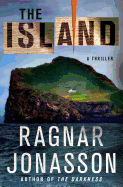
In The Darkness, Hulda Hermannsdóttir was on the cusp of forced retirement from the Reykjavík police department. The Island, which begins 25 years earlier, finds the detective agitating for a higher-ranking job that's opening at the station. Meanwhile, one of her colleagues is blackmailing another detective to ensure the conviction of a circumstantially guilty man whose 20-year-old daughter was murdered at the family's summer house.
Ten years later, Hulda, who lost the job she wanted to her crooked colleague, travels to the United States in hopes of finding her biological father, an American GI who had a fling with her now-deceased mother. With her husband and only child also dead, Hulda is picking her way through "the sorrow that now defined her life."
Back in Iceland, four friends reunite at a hunting lodge on the uninhabited island of Ellidaey to mark the 10th anniversary of the murder of the fifth person in their circle--the young woman killed at the summer house. When the four become three, Hulda is summoned to the island to investigate the death.
Ragnar Jónasson, who also writes the first-rate Ari Thór series, maximizes suspense by thwarting expectations. A typical example: The Island begins with a portentous-seeming scenario--a couple leaves their child with a babysitter--but the chapter concludes without serious incident; it's only toward the book's end that the reader learns the event's significance. The story in between is classic Jónasson: a refreshingly unbloody thriller that Hercule Poirot would have clamored to star in. --Nell Beram, author and freelance writer

